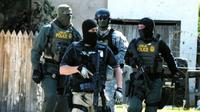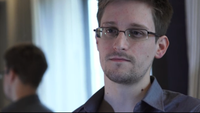-
Fusion centers collect information on non-threatening groups

Since the 9/11 attacks, federal and state surveillance of nonviolent student groups, protest movements, and mosques has increased along with the growth of fusion centers. Fusion centers serve as the focal points for the receipt, analysis, gathering, and sharing of threat-related information. According to DHS, there are fifty-three primary fusion centers and twenty-five recognized fusion centers across the United States.
-
-
Security vs. privacy
Those who ask you to choose security or privacy and those who vote on security or privacy are making false choices. That’s like asking air or water? You need both to live. Maslow placed safety (of which security is a subset) as second only to food, water, sex, and sleep. As humans we crave safety. As individuals and societies, before we answer the question “security or privacy,” we first have to ask “security from whom or what?” and “privacy from whom and for whom?”
-
-
Privacy board wants Feds to update security agencies’ operating rules
The independent Privacy and Civil Liberties Board says U.S. national security agencies are operating under outdated rules which should be revised to reflect advances in technology.The oversight board says that rules governing collection and retention of data about Americans need be revised to “appropriately capture both the evolution of technology and the roles and capabilities of the intelligence community since 9/11.”
-
-
U.K. newspapers complain government "conflating terrorism and journalism"
The U.K. government, relying on the Terrorism Act 2000, has recently taken actions against several newspapers, culminating the 18 August detention at Heathrow Airport of David Miranda. Miranda is the companion of Glenn Greenwald, the Guardian’s journalist who broke the Snowden story, and the security services believed Miranda, a Brazilian, was transporting Snowden-related material with him. He was detained and questioned for nine hours.
-
-
U.K. newspapers complain government "conflating terrorism and journalism"
The U.K. government, relying on the Terrorism Act 2000, has recently taken actions against several newspapers, culminating the 18 August detention at Heathrow Airport of David Miranda. Miranda is the companion of Glenn Greenwald, the Guardian’s journalist who broke the Snowden story, and the security services believed Miranda, a Brazilian, was transporting Snowden-related material with him. He was detained and questioned for nine hours.
-
-
NSA broke UN video-conferencing encryption, eavesdropped on deliberations

The National Security Agency (NSA) in 2012 broke the encryption which secured the UN internal video conferencing at the organization’s headquarters in New York. Among other things, the NSA discovered that the Chinese secret service was also eavesdropping on the UN.
-
-
U.K. detains, questions NSA revelations journalist’s partner
David Miranda, the partner of Guardian’s Glenn Greenwald who interviewer Edward Snowden and who wrote several stories based on documents provided by Snowden, was detained for nine hours by U.K. authorities at Heathrow Airport and questioned under schedule 7 of the Terrorism Act 2000. Miranda was released – schedule 7 allows a suspect to be held for a maximum of nine hours, and then the police must release or formally arrest the individual. – but the electronic equipment he was carrying with him, including his mobile phone, laptop, camera, memory sticks, DVDs, and games consoles were confiscated by the authorities.
-
-
NSA revelations hobble pursuit of a comprehensive cyberdefense initiative
NSA director General Keith Alexander has proposed a digital version of Ronald Reagan’s space-based Star Wars missile defense program, which Reagan unveiled in 1983. In Alexander’s vision, when a cyberattack is launched at the United States, the defense system would intercept and thwart the attack before it caused any damage. Intercepting a cyberattack would require the NSA to tap, track, and scan all cyber traffic entering the United States. The technology needed to intercept cyberattacks, however, is strikingly similar to the technology the NSA uses for the types of surveillance Snowden exposed. Post-Snowden, it is doubtful that the administration would pursue a comprehensive cyberdefense initiative, or that lawmakers would accept it.
-
-
DEA uses NSA surveillance information to make arrests

The Drug Enforcement Administration (DEA) has benefitted from multiple tips from the National Security Administration’s (NSA) surveillance programs – although not necessarily the programs revealed by Edward Snowden. DEA officials in a secret office known as the Special Operations Division (SOD) are assigned to handle incoming tips from the NSA. The information exchanged between the two agencies includes intelligence intercepts, wiretaps, informants, and a massive database of telephone records.
-
-
The FBI uses hackers’ methods in its surveillance programs
The U.S. government is planning to expand its suspect surveillance programs to include tactics which are commonly used by computer hackers.The FBI typically uses hacking in cases involving organized crime, child pornography, or counterterrorism, a former U.S. official said. The agency is less inclined to use these tools when investigating hackers, out of fear the suspect will discover and publicize the technique.
-
-
Russia grants Snowden a 1-year temporary refugee status (updated)

Edward Snowden has left Moscow’s Sheremetyevo airport and has entered Russia after he had been granted temporary asylum – the official language: a temporary refugee status — for one year. U.S. lawmakers said Russia’s decision had damaged U.S.-Russian relations. “Russia has stabbed us in the back,” said Senator Charles Schumer (D-New York). “Each day that Mr. Snowden is allowed to roam free is another twist of the knife.” The White House said the United States was “extremely disappointed that the Russian government would take this step,” a step which “undermines a long-standing record of law enforcement cooperation.
-
-
NSA director faces tough crowd at Black Hat conference

The National Security Agency (NSA) director General Keith Alexander was met with some applause but mostly skepticism – and even boos — when he spoke during a Black Hat conference in Las Vegas earlier this week. Alexander said that there are only twenty-two people who work at the NSA who can approve the surveillance of a specific phone number, and thirty-five analysts who can review the inquiries.
-
-
Russia grants Snowden a 1-year temporary refugee status
Edward Snowden has left Moscow’s Sheremetyevo airport and has entered Russia after he had been granted temporary asylum – the official language: a temporary refugee status — for one year. It is not yet known whether Snowden’s plan is to stay in Russia permanently, or whether he will try to move on to one of the four Latin American countries — Venezuela, Bolivia, Nicaragua, and Ecuador – which last month had offered him asylum. U.S. lawmakers said Russia’s decision had damaged U.S.-Russian relations, and the White House hinted that President Obama may cancel a planned summit meeting with Putin in Moscow in September.
-
-
U.S. Appeals Court: govt. does not need search warrant to track cellphones

Law enforcement agencies have won a victory Tuesday when a federal appeals court ruled that government authorities could extract historical location data directly from telecommunications carriers without a search warrant. The ruling by the U.S. Court of Appeals for the Fifth Circuit is the first ruling directly to address the constitutionality of warrantless searches of historical location data stored by cellphone service providers. He appeals court said that historical location data is a business record which is the property of the cellphone provider. The appeals court also said that the collection of such data by authorities does not have to meet a probable cause standard as outlined under the Fourth Amendment, which protects against unlawful search and seizure and requires a search warrant.
-
-
Two Chicago terrorism cases bring the issue of expanded surveillance to the fore
A Chicago attorney representing a teenager facing terrorism charges raised concerns during a pre-trial hearing about whether expanded surveillance methods were used in her client’s case. This is the second time in less than a month that the issue of expanded surveillance methods was brought up in a Chicago terrorism case.
-
- All
- Regional
- Water
- Biometrics
- Borders/Immig
- Business
- Cybersecurity
- Detection
- Disasters
- Government
- Infrastructure
- International
- Public health
- Public Safety
- Communication interoperabillity
- Emergency services
- Emergency medical services
- Fire
- First response
- IEDs
- Law Enforcement
- Law Enforcement Technology
- Military technology
- Nonlethal weapons
- Nuclear weapons
- Personal protection equipment
- Police
- Notification /alert systems
- Situational awareness
- Weapons systems
- Sci-Tech
- Sector Reports
- Surveillance
- Transportation
Advertising & Marketing: advertise@newswirepubs.com
Editorial: editor@newswirepubs.com
General: info@newswirepubs.com
2010-2011 © News Wire Publications, LLC News Wire Publications, LLC
220 Old Country Road | Suite 200 | Mineola | New York | 11501
Permissions and Policies
Editorial: editor@newswirepubs.com
General: info@newswirepubs.com
2010-2011 © News Wire Publications, LLC News Wire Publications, LLC
220 Old Country Road | Suite 200 | Mineola | New York | 11501
Permissions and Policies
